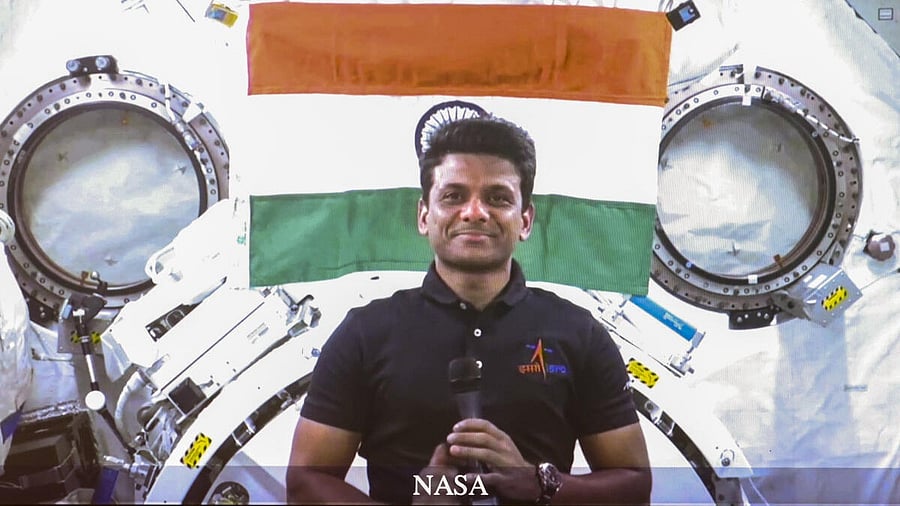
Group Captain Shubhanshu Shukla
Credit: PMO via PTI Photo
New Delhi: After setting up the experiments, Indian astronaut Group Captain Shubhanshu Shukla is set to interact with school students and scientists at the Indian Space Research Organisation (ISRO) from the International Space Station via a ham radio link on Friday evening.
The interaction is planned via a telebridge set up at the U R Rao Satellite Centre in Bengaluru, said the Amateur Radio on International Space Station, which facilitates interaction of school students with astronauts on the orbital laboratory.
Shukla’s fellow crew member Sławosz Uznański-Wiśniewski will also talk to students at the University of Wroclaw via ham radio on Friday while Hungarian astronaut Tibor Kapu will have a similar interaction on Thursday, according to the ARISS.
The programmes are aimed at inspiring students to pursue interests and careers in science, technology, engineering and mathematics through amateur radio-communication opportunities with the ISS on-orbit crew.
Meanwhile, Shukla has begun his second experiment in space focussing on micro-algae, tiny organisms that can be a rich source of food in future space missions.
The Lucknow born astronomer who became the first Indian to enter the International Space Station last week. carried out the experiment deploying sample bags and capturing images of the algae strains.
Microalgae are potentially useful organisms for future spaceflight as they can be used as foods, fuel, or in life support systems.
In the ISS study, three strains of microalgae will be grown and the impact of microgravity on the growth, metabolism, and genetic activity will be investigated versus algae grown on the ground, according to the Axiom-4 mission update.
The experiment, one of the seven that Shukla will be conducting, was designed by the biologists at International Centre for Genetic Engineering and Biotechnology, Delhi.
"If methods can be developed to grow them (microalgae) in larger quantities based on the findings in space, it could significantly aid food security on earth," Shukla told Prime Minister Narendra Modi during his interaction.
The crew also collected data for the Neuro Motion virtual reality project, where astronauts don VR headsets and perform attention-based tasks while their brain activity is monitored using functional near-infrared spectroscopy.
This research explores how microgravity affects cognitive and motor functions, which could provide valuable insight for future deep space missions.
Data was also gathered for the telemetric health AI study, which integrates biometric data with mission analytics to better understand how spaceflight impacts cardiovascular and balance systems.
By applying advanced data science techniques, this project could lead to smarter, real-time health monitoring — both on orbit and on Earth.
Shukla, an ace Indian Air Force pilot who goes by the call sign Shux, began the Indian experiments on June 28 when he spent time in the Life Sciences Glovebox working on the Myogenesis experiment.
This study aims to uncover the biological pathways behind skeletal muscle degradation in space, a major challenge for astronauts. By identifying these mechanisms, researchers hope to develop targeted therapies that could not only protect space travellers but also aid people suffering from muscle-degenerative diseases on the Earth.
Shukla and three other astronauts from the USA, Hungary and European Space Agency who travelled to the International Space Station will conduct 60 experiments during the 14 days of their stay at the space laboratory before returning to the Earth.
